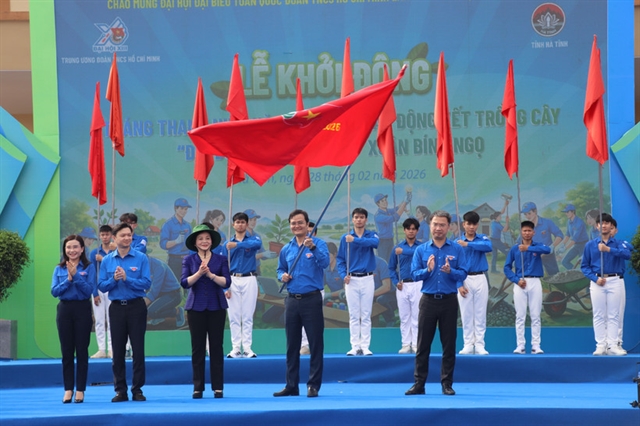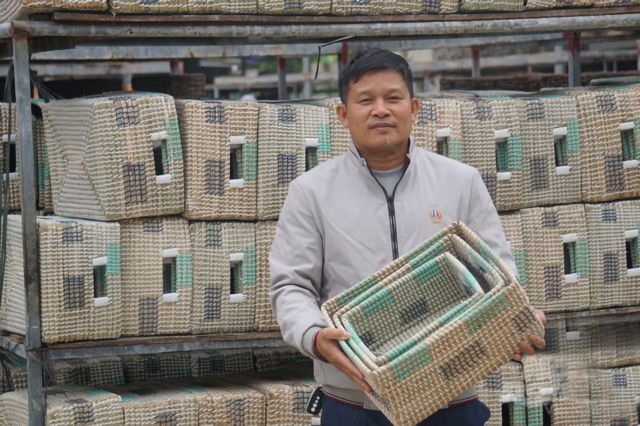 Society
Society

Phạm Minh Tôn, the 46-year-old man in Nga An Commune, has successfully brought a variety of handmade products crafted from sedge to the international market, surpassing the traditional craft of mat weaving.

|
Phạm Minh Tôn with craft products made from sedge. — Photo nongnghiep.vn
This seagrass has not only contributed to the prosperity of many local residents but has also garnered favour from customers both domestically and internationally for the sedge-made products crafted by the locals.
Phạm Minh Tôn, the 46-year-old man in Nga An Commune, has successfully brought a variety of handmade products crafted from sedge to the international market, surpassing the traditional craft of mat weaving.
In 1998, at the age of 20, he decided to leave his hometown and move to Hà Nội to find a job after graduating from high school.
He took on various jobs, including selling books on the street.
One day, while selling books around Hoàn Kiếm Lake, he met a foreigner who asked him something, but due to his limited English, he could not answer.
After that encounter, he thought to himself: to succeed, he must know English.
From then on, while selling books during the day, he enrolled in a language centre and self-studied English in the evenings.
Later, he went to work for a handicraft export company in Ninh Bình Province.
Tasked with developing the market, he, not knowing much about it, learned and explored while working.
"Nga Sơn is the cradle of sedge in Việt Nam, but local labour still has to work for sedge enterprises in other provinces. Meanwhile, although sedge is considered a key product, it is mainly sold as a raw material, so the prices are not high. Therefore, despite living in the sedge cradle of the country, people here are not wealthy," Tôn told Nông nghiệp Việt Nam (Việt Nam Agriculture) newspaper.
Tôn said that working in Nình Bình helped him gain a lot of experience and skills in his job.
However, this also made him think that, no matter how good he was, he was still just a hired worker. Once, standing in front of a sedge field, he thought about what he should do.
Tôn quit his job in Ninh Bình Province and returned to his hometown.
He began to meticulously research the nature of sedge, seeking to answer the most critical question; what other products can be made from sedge besides bed mats?
The night before making his decision to quit his job, Tôn told his wife: "In the next few years, I won't have much money. You'll have to take care of the children's expenses, education, and living costs."
In 2009, Tôn established the Việt Anh Sedge Production Export Joint Stock Company.
The decision to start a sedge business at that time brought him many challenges.
For a long time, he received threatening messages from strange phone numbers, and even faced slander simply because others were jealous of his entry into the sedge market.
After renting more than 9,000m2 of land for the workshop, the first market Tôn targeted was China.
It was his first time going abroad to explore this vast market, and the result was both challenging and cost him about VNĐ500 million (US$20,390).
"If consumed domestically, the business would have to accept going through intermediaries, so the prices would be low. If I accepted such a business model, I would still be a hired hand for others. Meanwhile, the international market, despite strict criteria and product standards, has significant and stable long-term purchasing power. Products exported to large corporations can be placed on shelves for immediate sale," Tôn said.
In 2011, Tôn was one of the few representatives of Vietnamese businesses selected to accompany the working delegation of the Ministry of Industry and Trade to go abroad to attend an exhibition of sustainable development products.
This event marked a turning point in the business of his enterprise.
"That trip helped me understand what the foreign market needs and how to expand the consumption market. Fortunately, among the 5,000 businesses participating in the exhibition, a Spanish enterprise was very impressed with the rattan products and contacted us to place an order," he said.
However, the partner did not advance any funds to Tôn's company for production.
Nevertheless, he accepted this order.
Along with his colleagues, he mobilised more skilled craftsmen in the region, focused on ideas, and produced various sedge products such as flower vases, fruit baskets, storage boxes, clothing boxes, seat mats, travel mats, with the most beautiful and exquisite designs.
All the capital of the company at that time was invested in this first order.
Then the first container was taken to Hải Phòng port to cross the ocean to Spain.
This daring decision put Tôn in a "win or lose all" situation because if the exported goods did not receive a positive response, it would mean bankruptcy for him.
Fortunately, the Spanish partner not only paid for the goods but was also quite impressed with the company's products.
"Later, they raised the issue of long-term business with the company, which gave me a stable trade relationship," Tôn said, adding that it was the first time he had a large sum of money to give to his wife and children after many days of struggling to start a business.
After the success of the first export batch, he went to the United States to expand the market.
Up to now, the company's products have been placed in the retail systems of many large corporations in the United States, such as T.J. Max, Marshalls and Ross, and have been well-received by consumers in this demanding market.
"Looking back at that time, I realise how daring I was," he said.
After succeeding with products made from sedge, to expand the market and diversify products, Tôn and his colleagues decided to create additional items made of water hyacinth, banana bark, and bamboo.
To date, his company has more than 50 handicraft products exported to the US and other countries.
Every month, 50-60 containers cross the ocean, bringing in revenue of VNĐ120-130 billion ($4.89-$5.3 million) per year for the company.
According to local elders, Nga Sơn's sedge mat was one of the items presented to the royal court, favoured by kings, lords, and nobles.
Nga Sơn sedge is known for its small, durable, and smooth fibers. In particular, few places can grow the long type of sedge found in this region, which is specifically used for weaving beautiful and durable bed mats. Later, Nga Sơn sedge was exported to both the Soviet and Eastern European markets.
In 2011, the Intellectual Property Office granted Nga Sơn sedge a geographical indication certificate.
"Despite being renowned and having products exported abroad and protected by intellectual property rights, maintaining and developing the sedge cultivation industry is still a significant challenge," he said.
From 1980 to 2000, sedge cultivation in Nga Sơn was neglected as it did not provide income and lacked outlets, especially when the markets of the Soviet Union and Eastern Europe disappeared. The traditional profession passed down through generations appeared to be fading away.
Tôn said: "To revive, maintain, and develop the sedge industry, the only way is to expand the market, especially by elevating the quality of sedge plants and sedge growers."
However, the difficulty in exporting to demanding markets like the US, EU, Japan lies in their requirements.
"The partners require the company to install automatic fire prevention and fighting systems, workshop scale, and environmental issues according to European and American standards. Sedge products must ensure health safety and be environmentally friendly. Failure to comply with the regulations may lead to the termination of cooperation," he said.
They also demand the installation of surveillance cameras and regular on-site inspections. These tasks are not easy for manual labourers who are accustomed to more casual working conditions.
"Everyone strives to meet these requirements as they understand that sedge products represent the face of sedge growers. Over time, everyone has adapted to these stringent standards," he said.
Tôn's company now has two production workshops with a total area of 15,000 square meters, providing regular employment for over 40 direct workers at the company and 2,000-3,000 indirect workers, who receive products to work on at home, with an average income of VNĐ4-8 million per person per month.
Many craft products from his company have been recognised as four-star OCOP products and are aiming for five stars.
To create a stable and sustainable source of raw materials, Tôn has connected with around 1,000 households in the area, establishing a material-producing region and attracting direct and indirect labour for the company.
The company has also opened vocational training classes for local people, guiding them through the process and techniques to produce environmentally friendly goods that meet market requirements and customer preferences.
"I have been attached to sedge for decades. I feel proud every time Nga Sơn's sedge products are present in the international market," said Tôn. — VNS

.jpg)


